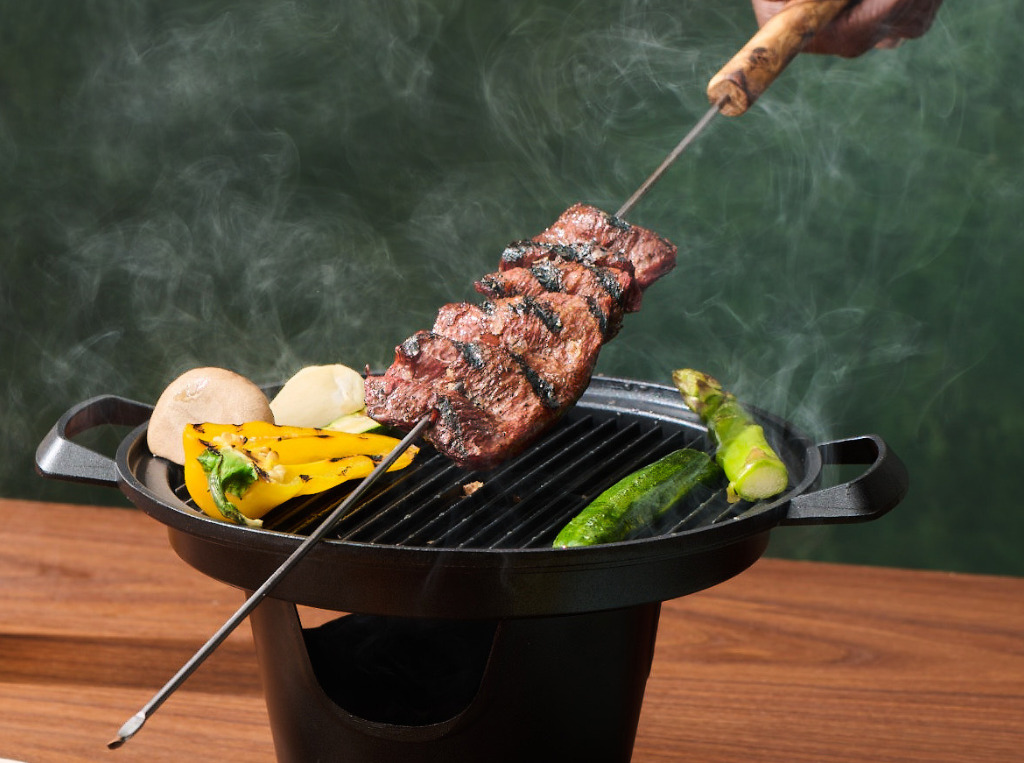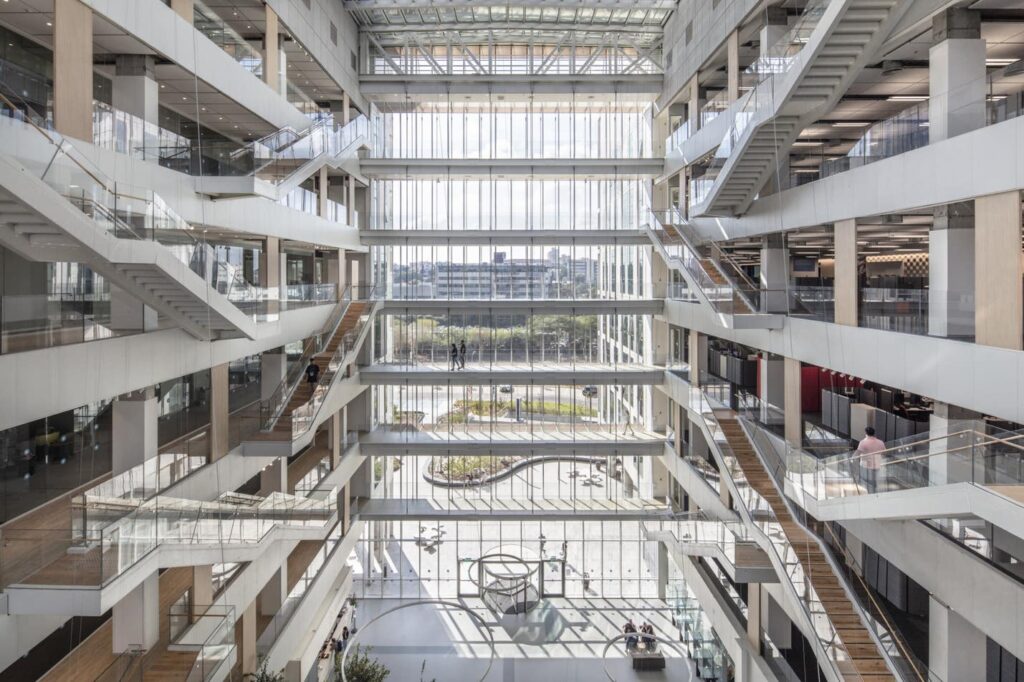
Aleph Farms CEO Didier Toubia on why the cultivated meat firm hasn’t launched yet, its plans for the UAE, its ongoing fundraise, and comparisons with the dotcom bubble.
It has been 21 months since Aleph Farms was approved to sell cultivated beef in Israel, 15 months since it laid off 30% of its staff, and six months since it raised $7.5M in the first closing of a fresh funding round.
A rollercoaster would be a good way to describe the startup’s previous two years, which included regulatory applications in Switzerland, the UK, and Thailand, and a $21.5M via a SAFE that converted earlier this year.
It is one of the longest-standing cultivated meat companies around. Whether cultivated meat is a technology trigger, at its peak of inflated expectations, or under the current trough of disillusionment in the Gartner hype cycle, Aleph Farms has been there for the whole ride.
Now, the industry is fast-approaching the next stage: the slope of enlightenment. Aiming to lead the way is what co-founder and CEO Didier Toubia calls “Aleph Farms 2.0”.
“Aleph Farms today is very different from the Aleph Farms of 2021-22,” he tells me. “We implemented a lot of changes… to make sure that Aleph Farms is actually in the best position to lead this new category for cultivated meat.”
In 2023, the model of the cultivated meat industry was to go big and fast—expand scale at all costs and launch as quickly as possible. As capital costs increased and investors became more risk-averse, Aleph Farms began focusing on profitability instead by becoming leaner and more capital-efficient.
“We have paused our investments in large plants and big facilities, and postponed our launch to really take the time first to reduce our costs, improve the scalability of our platform, and build the foundations right before we expand,” says Toubia.
He adds that the layoffs last year were part of this – today, the firm has around 40 employees. Moreover, it has decided to recede from the US, instead prioritising smaller markets with lower volumes first. This would help reach profitability faster, which in turn would make it easier to raise money.
Regulatory updates and plans for UAE and EU

Toubia says Aleph Farms is likely the most advanced company in the regulatory approval processes in Switzerland and the UK (where at least four others have filed). In the latter country, the firm is part of the Food Standards Agency’s (FSA) regulatory sandbox, and was the first to reach the ‘validation’ and ‘suitability’ phases, leaving it three steps away from approval.
“The FSA in the UK is very professional, and I think they’ve really taken to this issue proactively,” he says. “There are good chances that they would actually be the next to prove a cultivated meat product. Of course, I hope it will be Aleph Farms. But, you know, any approval is good for the industry.”
The startup’s filing in Singapore predates these applications. The city-state was the first to clear cultivated meat for sale (back in 2020), and has since issued another approval. Aleph Farms – like a dozen or two others, according to Toubia – is still awaiting a decision.
“It has been delayed for a bunch of reasons,” he says. “After being the first country to approve cultivated meat at the time, they really want to make sure that they are not perceived as a country where it is easy to get approvals.”
The raft of applications has put a strain too. Toubia believes many companies that have filed for approval don’t actually intend to conduct business in Singapore – they just thought it would be easy to get clearance.
“We do see Singapore as a hub for Asia,” he argues. “We’re big believers in Singapore. We believe that the potential is great and that it’s a great footprint for us in Asia. So we remain very committed and excited about the opportunity in Singapore.”
Further, Toubia reveals that Aleph Farms plans to pursue regulatory approval in the EU (where two companies have already filed), as well as the UAE, which would be an entirely new region of focus for cultivated meat.
“We have a strong agenda in terms of food security at Aleph Farms, which is raising a lot of interest, essentially because of the geopolitical tensions, tariffs and disruptions of supply chains globally, especially for animal proteins,” he explains.
Aleph Farms optimises tech and production strategy

Speaking of approvals, when Aleph Farms earned the green light in Israel, it was contingent upon clearing a Good Manufacturing Practices (GMP) inspection for its production facility. That is still pending, though the company has transferred its production onto its new “platform 1.2”.
This is an optimised, simplified version of its initial tech, with faster timelines, greater efficiency, and fewer steps. “We are now in the process of completing the GMP and all the other certifications to be able to start producing commercially with this new platform,” says Toubia.
“We want to make sure that when we launch, we have continuity in the delivery of products,” he adds. “We’ve seen in the industry that sometimes, launching a product which is very expensive, not available, then pulling it back from the market is actually doing more harm than good.”
A recent independent analysis showed that Aleph Farms’s cultivated steak could be produced at $6.45 per lb and sold in wholesale for $12.25, generating annual net profits of $78.5M. With further process enhancement, the cost of goods sold could fall to just $4.08 per lb.
The firm operates a 65,000 sq ft plant in Rehovot, Israel (with a capacity to initially produce 10 tonnes of cultivated steak annually), has signed a co-manufacturing deal with Singapore’s ESCO Aster, and is building a factory in Thailand with biotech firms BBGI and Fermbox Bio.
Moreover, this month, Aleph Farms teamed up with The Cultured Hub, a biotech facility situated in The Valley in Kemptthal, Switzerland, to produce cultivated meat. It’s meant to be a regional hub that serves as a “cornerstone” for expanding capacity in Europe.
“We’re walking the talk, building and setting up production capacities closer to our markets, and taking operations out of Israel. It also demonstrates the feasibility of our strategy for relying on partners for production,” says Toubia. “The plan with The Cultured Hub is to use the existing plant in the capital, but also to further explore opportunities to operate additional, larger-scale plants, with a focus on Europe.”
Where would these be located? “It could be, of course, in Switzerland, but [we’re] also looking at opportunities in the UK and in Eastern Europe.”
‘Indulgent like beef, healthy like chicken breast’

It’s not just the production process that Aleph Farms is fine-tuning. “We’ve also done a lot of work on the product itself,” says Toubia. “I think that it’s important to get the product right, at the right price and to the right consumer – more important than the technology itself.”
He continues: “That’s something that sometimes other cultivated meat companies are not necessarily spending enough time on. There’s a lot of focus on technology and not necessarily on getting the product right.
“People will not buy a product just because it’s a cool product made by an advanced technology. Aleph Farms is the only company cleared today [to sell] cultivated beef products with natural cells – not immortalised, not GMO – as whole cuts.”
The firm’s first product is a Black Angus Petit Steak, and it’s working on a thicker steak too. “We’ve done a lot of work to really focus on trends for proteins… providing an optimised nutritional profile for the product that’s high in protein, low in calories and fat, high in micronutrients, to really target this segment of the market,” he says.
Another trend that’s amplified of late (thanks to the rise of GLP-1 drugs) is healthy indulgence. “A lot of people today want to eat less, but want the portions to be both indulgent and tasty and healthy at the same time,” he explains.
“And today, beef is considered indulgent and tasty, but not as healthy, for instance, as chicken breast, just because it’s heavier to digest, and richer in calories, fat, and cholesterol. Our goal is to deliver a new product that is healthy like a chicken breast, but indulgent like a beef fillet.”
Toubia says this is a new niche that would appeal to several consumer groups: “We need to make sure we’re targeting a segment large enough to really drive scale-up and traction in the market.”
Aleph Farms looking to raise up to $25M by year-end

To date, Aleph Farms has raised $147M, including the $29M it announced from the SAFE conversion and new funding. Now, it’s working on a second closing of the latter round by the end of the year, targeting a cumulative raise of $20-25M (including the $7.5M from March).
“The refocus away from scale into building a profitable business also implies a plan where we intend to raise much less money than the plans we had in 2021-22, because today, investors really want to see capital efficiency,” says Toubia.
“They want companies with less capital to reach more significant milestones and become profitable. So relying on external partners for the production is also where to minimise all direct investment in capex and equipment.”
Aleph Farms has a three-phase plan to maintain its leadership in the industry. The first stage is centred on growth foundations, with the business aiming to launch products with restaurant partners in Israel and Singapore by 2027, as well as achieving positive gross margins.
The second phase focuses on profitability between 2027 and 2028, and involves expansion in Asia-Pacific and the EU, building capacity, and garnering government support and offtake agreements.
It’s only after 2028, in the third phase, that Aleph will go all-in on scale. The company aims to launch in the US and Japan, while introducing new products and entering premium retail stores.
Cultivated meat akin to the dotcom bubble

Toubia compares the cultivated meat sector to the dotcom bubble of the late 90s. “We saw a lot of companies raising a lot of money and valuations going to the sky. A lot of junk and not very good companies were funded, with a strong focus at the time on scale and gaining a user base, rather than focusing on profit,” he recalls.
Then came the crash, with the value of the Nasdaq index sinking by 78%. “Companies were able to really rethink their business and their focus on building real, profitable businesses,” he says. Those who did – Apple, Google, Amazon, and Microsoft among them – emerged from the slump and own the market today.
“It’s not a perfect analogy, but the same process is happening with complementary proteins,” he says. In 2020-21, a lot of money flowed into the space, but capital in this sector has shrunk alarmingly in the years since.
“After this excess of 2020, we’ve seen an opposite kind of excessive situation where, in 2023-24, many investors stopped completely investing in the space,” he explains. “Today, we’ve started seeing a kind of a rebound of the sector, which is much more rational and focused on… analysis of the fundamentals of the companies.
“In the next five years, we see a smaller group of companies really emerging as the category leaders. And those companies would be the ones which understand the market and the consumer, which are developing the right product at the right price for the right consumers, which are going to maintain the costs and focus on operational efficiency,” says Toubia.
“I believe Aleph Farms will be part of those few leaders emerging from the last two years of downturn.”
The post Aleph Farms CEO on Cultivated Meat Launch & Regulatory Plans for UAE & EU appeared first on Green Queen.
This post was originally published on Green Queen.